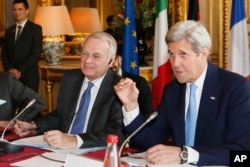U.N. envoy for Syria Staffan de Mistura began a new round of peace talks Monday in Geneva, warning that the only alternative to the negotiations is returning to "even worse war than we had so far."
Speaking before meeting with a delegation from the Syrian government, de Mistura said it is up to the people of Syria to decide their future, and the U.N. must help them.
He said the plan is to hold indirect talks with each side for about 10 days, then after a recess convene the next round of negotiations beginning in early April and another one after that. The envoy said he believes the process will yield at least a roadmap for peace
"By then we believe that we should have at least a clear roadmap – I'm not saying an agreement, but a clear roadmap – because that is what Syria is expecting from all of us," de Mistura said.
He also stressed the need to maintain the cessation of hostilities and increased humanitarian access that have been in place for more than two weeks.
But serious questions remain about what each side is prepared to accept in order to stop the fighting that over the past five years has already killed more than a quarter-million people and led millions more to flee their homes. More than 6.5 million people are estimated to be internally displaced, half of them children, and another three million have taken refuge outside Syria.
De Mistura said the talks will focus on new ways to govern Syria, a new constitution, and what he calls the “mother of all issues” - plans to elect, under U.N. auspices, a transitional government in the next 18 months.
Syria firm on Assad
Syrian Foreign Minister Walid Muallem has warned that Syrian President Bashar al-Assad's future is not up for negotiation, while the opposition and many outside of Syria – including the United States – have said Assad must step down in order to achieve peace.
De Mistura said Monday that public statements by both sides show there is "much distance" between them.
The U.N. envoy is using an agreement reached by a group of world and regional powers last year in Vienna as the basis for negotiations.
De Mistura did not comment on disagreements surrounding Assad's future but did acknowledge problems are likely to arise.
“If during these talks and in the next rounds, we will see no notice of any willingness to negotiate, which we hope is not going to be the case… we will bring the issue back to those who have influence and that is the Russian Federation, the USA, co-chairs of the ISSG (International Syria Support Group) and to the Security Council,” he said.
De Mistura added the current negotiations are the only hope for a solution.
“Well, as far as I know, the only plan B available is return to war and to even worse war than we had so far,” de Mistura said.
US position
U.S. Secretary of State John Kerry said Sunday violence has been "hugely reduced" by 80 to 90 percent since the cessation of hostilities went into effect.
But he accused the Syrian government of "clearly trying to disrupt the peace talks, saying Assad's forces are the "single biggest violator" of the cease-fire. Rebel groups have also been accused of violating the agreement.
U.N. officials say the cessation of hostilities has made it possible for U.N. and partner agencies to deliver food, medicine and other aid to 115,000 Syrian civilians living in areas under siege by government or opposition forces. They say last year, aid agencies were unable to access any of these areas.
But Kerry said he continues to be “deeply concerned” about the Syrian government’s efforts to deter the delivery of medical and surgical supplies.
Lisa Schlein contributed to this report from Geneva.







